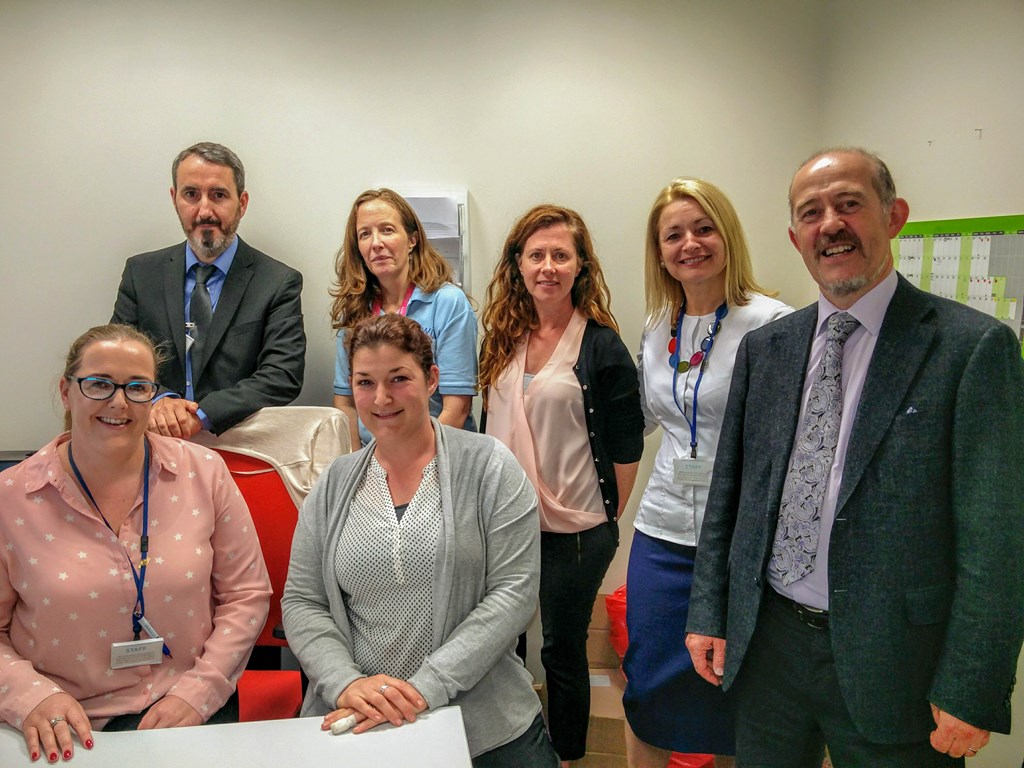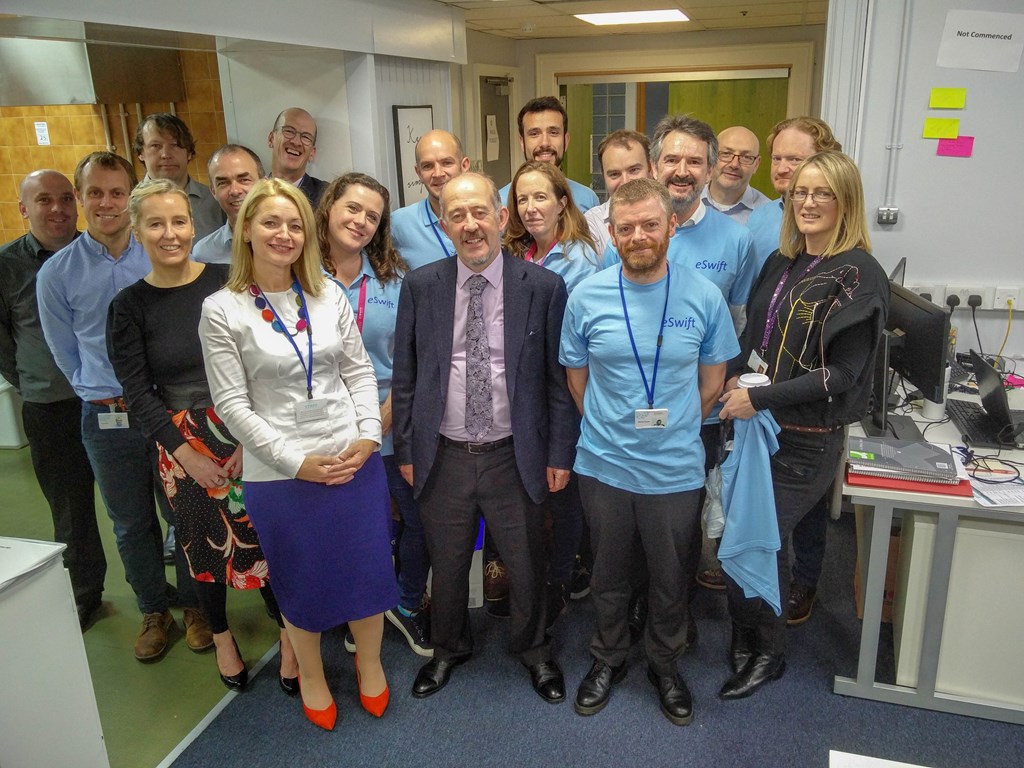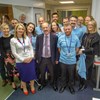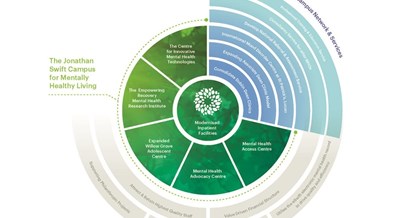The SPMHS range of services incorporates in-patient and day services and the Dean Clinic network, ensuring continuity of the most appropriate care and treatment for our service users on their journey to recovery.
We provide a confidential telephone and email service, and a helpline for 18-25 year olds, staffed by experienced mental health nurses 9am-5pm, Monday to Friday, with an answering and call-back facility outside hours.
Day Service Attendances
Key Service Delivery Developments in 2017
-
Expansion and review of recovery programmes
The organisation provides a wide range of inpatient and day service psychological and recovery programmes for young adults, depression management, eating disorders, bipolar disorder, psychiatry of old age, alcohol dependence, dual mood and addiction disorders, memory clinic and anxiety management. New psychotherapy interventions further developed during 2017 included a Radical Openness Programme, Compassion-Focused Therapy Programme and Living Through Distress Programme.
At St Patrick’s, our multidisciplinary services and programmes are continually reviewed, enhanced and expanded to ensure our service users can take advantage of the latest innovations and to keep in line with best practice at all times.
-
Compliance with Mental Health Commission Standards
The central focus of SPMHS has always been and continues to be the delivery of excellent care and treatment to those in need of mental health care.
In 2017, St Patrick’s continued its commitment to provide the highest quality care attainable and we are proud to have achieved a high level of compliance with the Mental Health Commission Inspection standards and regulations.
-
eSwift Transforming Mental Health Care and Information
The introduction of the eSwift Electronic Health Record (EHR) system to SPMHS in 2017 represents a major organisational transformation and is one of the most significant developments for the organisation in recent years. eSwift will transform the way we provide and record our care to our service users and will improve our information accessibility, quality and governance.
eSwift was first introduced to our Willow Grove adolescent unit on September 27th 2017 and it went live in both St Patrick’s University Hospital and St Edmundsbury Hospital on October 11th. Full implementation was completed in November when eSwift went live in our community Dean Clinics.
A strategic project of this scale is always challenging, but the clinical, technical and project management skill mix within the eSwift team was a critical success factor in delivering this project on time, in budget and within scope. eSwift is the culmination of a multiyear programme of up to 40 embedded projects, commencing in June 2016 at the signing of contract.
-
Technical modernisation
In order for EHR to be available reliably to staff, a significant programme of technical modernisation needed to be completed by the time we went live with eSwift.
This included:
- A network upgrade across all our sites, including the Dean Clinics
- The provision of secure remote access to eSwift for clinicians any time anywhere —including from home, clinics, or off-site
- The deployment of over 500 laptops and desktops to wards, non-ward based clinicians, management teams, and training rooms between June and October 2017. All devices deployed were new, secured and encrypted.
Another part of the modernisation project involved integrating a number of clinical systems with eSwift. This included connecting with our external laboratory, incident management system, pharmacy system and our text message service provider which sends appointment reminders to service users. The integration engine was a key enabler to providing an integrated EHR delivery.
-
New eReferral
A second major development for the organisation in 2017 was the introduction of our new e-Referral and Assessment Service to improve speed of access to assessment and treatment.
In September 2017, SPMHS commenced receipt of electronic referrals from GPs through our partnership with HealthLink National e-referral system and Clanwilliam Health.
In addition, we provided appropriate technologies to support prompt assessment of need electronically, with phone and video options available for service users.
In another transformational step on our digital journey, we also implemented electronic systems for our HR, Finance, Procurement and Facilities Departments.
-
Data Protection
Data protection continues to be an important operational, legislative and compliance imperative for SPMHS as we are responsible for handling the personal and sensitive information of service users who entrust their care and information to us.
A key step for the organisation was the introduction of an Information Governance Framework in April 2017 to ensure consistent organisational wide practices in relation to the quality, integrity, safety and security of information and appropriate access to and use of information.
The organisation also enhanced its preparatory work for the introduction of EU General Data Protection Regulation in May 2018, which included a review of all our data protection policies, procedures and processes.
In 2017, we received and processed over 200 requests for information. We also received our first access request for a copy of a service user’s eSwift records.
-
New Strategy Changing Minds. Changing Lives.
SPMHS is driven by a commitment to provide the highest quality mental health care, to promote awareness of mental health and to protect the rights of those who experience mental health difficulties. Over the last five years, we have sought to fulfil this commitment by implementing our strategic development plan, Mental Health Matters.
During 2017, the organisation achieved agreement on an ambitious new strategic plan for the coming five years entitled Changing Minds. Changing Lives. 2018-2022.
Based on a strong human rights framework and a recovery model of service delivery, we are committing to the development of the physical infrastructure, national network and operational excellence of SPMHS.
-
Human Resources Service Delivery
SPMHS deliver care and services to our service users through our 700 staff across a range of disciplines, both clinical and non-clinical. To ensure we are always able to deliver the highest standards of care, we are committed to creating and maintaining a working environment within which all staff are empowered and encouraged to reach the fullest extent of their potential.
We realise this vision by working in partnership with the wider SPMHS organisation to provide leadership, support and guidance in the development and implementation of the policies, procedures and practices required to assist SPMHS in the achievement of our clinical and commercial objectives.
Part of meeting these objectives is being able to respond to recruitment challenges in a timely manner, and maintaining and developing our existing skills base.
To this end, HR continued to lead and support the organisation in meeting recruitment challenges across all departments and disciplines in 2017 against the backdrop of an increasingly competitive labour market. We advertised 128 positions, of which 12 were new roles with the balance being replacement posts. Overall staff turnover for 2017 stood at 5.3%, a decrease on 2016 of one percentage point.
-
GP Digital Strategy
Managing the various channels of digital media allows us to quickly communicate a large range of information to many audiences.
SPMHS digital media is moving fast to ‘mobile first communications’ and there are many opportunities to establish digital media as an important driver of referrals to our services by GP.
In January 2017, a Digital Strategy for GPs was finalised, approved and rolled out.
Activities included:
- Increasing subscriptions to the GP mailing list by 68%.
- A redesigned GP eNewsletter sent quarterly during 2017 in addition to one-off information emails.
- GP Targeted Google AdWords Campaigns throughout the year.
- LinkedIn campaigns targeting GPs and health/ mental health professionals
- Website GP traffic: Unique page views to the ‘make a referral’ page increased by 4.16% to 13,321 in 2017 from 12,789 in 2016.
- Website re-design: The St Patrick’s website was redesigned in 2017 and will be launched to coincide with the launch of the new strategy in 2018.
- GP Films: A number of GP targeted films were produced in 2017.
- New Information Films: Three GP Information films were developed and accredited for CPD by ICGP in 2017. They will be rolled out on a GP Portal that has been developed for the newly designed site.
- Support and Information Service: promoted across all social media channels throughout 2017.
-
New Opportunities
In 2017, SPMHS continued to provide services to a number of HSE community health organisations (CHOs). The services provided under service level agreements with the HSE included mental health assessment, outpatient treatment of children and adolescents and provision of inpatient care to adults.
SPMHS welcomes the opportunity to continue to build its constructive partnership with the HSE to provide much needed services to children, adolescents, and adults where there are capacity constraints locally.
-
Outcome Measures
Every year since 2011, SPMHS has undergone a process of assessing and monitoring the efficacy of our services through the measurements of outcomes which are published in a report.
We are one of the first mental health organisations in the country to produce on an annual basis, a report that attempts to collate, analyse and synthesise information relating to the organisation’s outcomes with respect to its clinical care pathways, clinical governance processes and clinical outcomes.
During 2017, we expanded the range of services and programmes that produce outcome measures.
Continue to…
Number of Admissions










